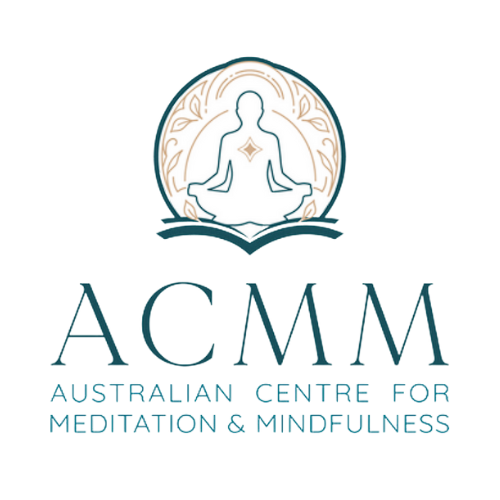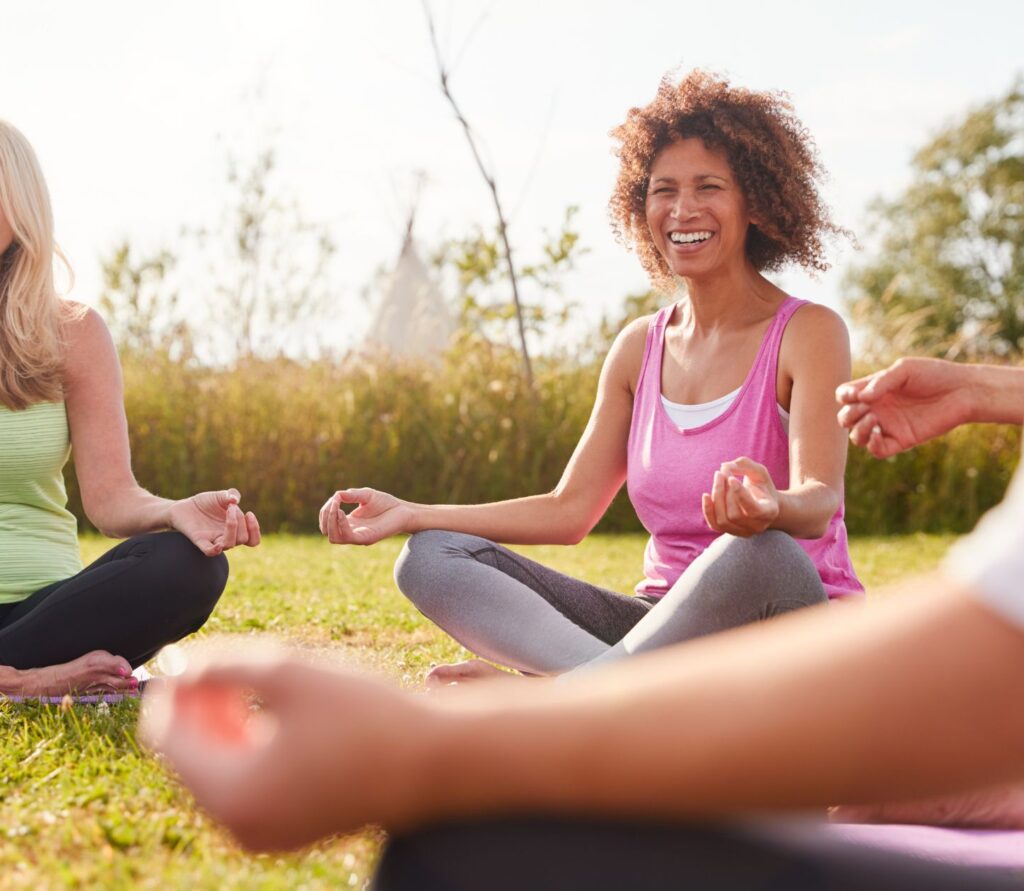If you are interested in planning a meditation retreat, there are a few things you may like to consider. Meditation retreats can be delivered in a range of ways. The only limit when creating these nurturing experiences is your imagination.
Why as a Meditation Teacher, would you run a Meditation Retreat?
Meditation retreats are a beautiful way to provide a comprehensive and holistic meditation and mindfulness experience. Retreats can offer your clients an opportunity to take some time out from the busyness of modern-day life. They provide an environment where attendees can be guided into further exploring their personal practice. As Yogaveler explains, “A meditation retreat is a withdrawal from the activities of daily life to spend dedicated time at a place that is designed to support meditation practitioners in their practice.”
Planning a meditation retreat involves creating a space that is supportive of relaxation, restoration and free from distraction. It allows attendees to deepen their personal practice. As well as integrate the benefits of their meditative and mindfulness experiences. Without the rush back to work, or other life commitments. Attendees can experience a greater sense of enrichment and wellbeing. One that sustains them long after the end of the retreat.
Meditation retreats can also offer teachers the opportunity to further develop and explore their own unique teaching style. It can bring about many valuable insights and learnings. They can be an opportunity to explore a greater sense of creativity and variety in your teaching. As well as supporting a deeper sense of connection with your clients through shared experiences and meditation.
How to plan a retreat
The following points are designed as a gentle guide to help you get started. Think of them as the foundations of the retreat you can create, knowing that you will bring to life the details in your own way.
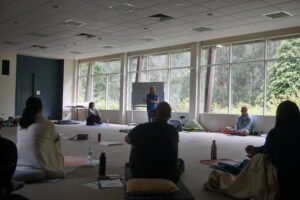
1. Theme and Format
A great first step when planning a meditation retreat is to think about the theme and format for your retreat. There are a range of different formats that a meditation retreat may take, from day retreats to weekend retreats and multiple day retreats, each has its own benefits and limitations. Day retreats can be a great place to start when organising your first retreat. Often, they can be logistically less complex and require less of a financial investment.
In additional to the format of your retreat you may like to think about a theme for your retreat. Themes are a fantastic way to set the intention for your retreat and also support you in curating meditations and activities that are aligned with what you’d like to offer. Themes not only support you in focusing on the intention of your meditation retreat, but they can also help you market and advertise your retreat offer with clarity and draw attendees who would benefit from the teachings.
A theme can be about anything that resonates for you or your clients, it could even be something you personally would like to offer and explore through your teachings. Here’s some examples:
- Sound Healing Retreat
- Nature-Based Retreat
- Rest and Reflect Retreat
- Soulful Self-Care Retreat
You may like to think about what techniques and styles you love to teach and explore what theme evolves from there (there are some great journal prompts at the end of this blog to help you).
Once you have clarity around your theme and format it’s time to start planning your retreat budget.
2. Budget
Importantly, when planning a meditation retreat it’s great to be aware of the money that you have available to invest in the retreat planning, preparation and execution. While of course you will be designing your retreat to make a profit, these funds may not be available prior to ticket sales. Often there may be a requirement to pay deposits for venues, accommodation, catering, or any other services that are part of your schedule. There may be a length of time between deposit payments and ticket sales which will mean you’ll need the cashflow to be able to pay these expenses.
Some questions you may like to explore are:
- How much money do you have available right now to invest in your retreat?
- Will this money allow you to run a day retreat (where only venue and catering may or may not need to be paid for) or will it be enough to pay a deposit on accommodation and other facilitators?
- Will you need to request initial deposits from attendees to support your cash flow?
- If you don’t have what you need right now, what would you need to budget to support the planning of a retreat in the future?
Once you have an awareness of the initial funds available it can be helpful to create a retreat budget to help you track overall expenses and break down the cost you’ll need to charge for each ticket.
A simple budget can be created in excel.
Some of the items you may like to include on an excel sheet are:
- Venue hire fees (including main room, breakout rooms or other facilities required)
- Accommodation fees (broken down into single or shared rooms)
- Catering costs (will you provide three meals per day,
- Travel costs (will a bus or additional travel need to be arranged for guests?)
- Retreat materials (will you need to provide paper, pens, journals, items for any other activities?)
- Additional facilitator costs (will you be having any additional facilitators attending or presenting?)
- Support staff costs (will you need to hire or pay anyone to assist you at the retreat?)
Once you have a general idea of the costs you may like to add on an additional amount for your profit and time and then work out what the final ticket price will be for attendees.
While starting, or maintaining a budget can seem scary at first, it will help you stay on top of your retreat expenses and sales which will ultimately help you earn a profit for all your hard work.
3. Location and Venue
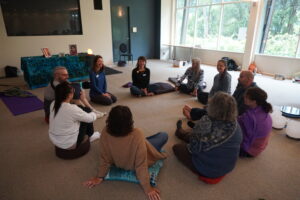
As the saying goes, location is key! The location of your retreat and the facilities available. These can be the most important factors to consider when planning your retreat. As mentioned above, a retreat is a place for your clients to switch off from their everyday life and take the time to rest. Cultivating an environment that facilitates this experience first starts with the location. A location that is quiet, ideally has access to nature and provides a range of accommodation options (such as shared or single rooms) are some of the key elements you may like to consider when researching a venue.
A suitable location for day retreats
If you’re planning a single day meditation retreat, you may like to consider a location that is easily accessible for your clients (one that won’t take too long to drive to or be difficult to access). If you’re planning a longer stay, then a venue that has ample options for public transport (for both local and interstate attendees) is vital. You may like to consider:
- Is there a central airport close by?
- Are there transport options for those attendees who prefer not to or are unable to drive?
- Are you going to offer transport to and from the venue?
- Is there access to emergency services (if needed) such as doctors and hospitals (although the hope is this is never needed, it can be reassuring to know that timely help is available should it ever be needed)?
You may also like to consider other facilities available such as where you (or a caterer) may be able to prepare and serve meals, proximity to eateries if you are not catering, the size of the room/s where you’ll be facilitating as well as other bonuses such as outdoor space for nature practices.
Bonus tip: While technology can be a wonderful help when planning your retreat, there’s nothing quite like the real thing. You may like to ask your desired venue if you can arrange a time to view the space in person (this can be invaluable when planning your activities and retreat runsheet!)
4. Balancing your program and activities
Once you have clarity around your retreat theme, budget, and location then you can start planning all of the amazing teachings and activities you’d like to offer on your retreat. This is the fun bit and time for all your wonderful ideas to come to fruition!
Activities that are in alignment with your theme can help embed your teachings throughout the retreat and build a sense of continuity and flow, so this is a great place to start. For example, if you’ve decided to run a Sound Healing Retreat, what activities will support this? Perhaps a sound healing meditation, a shamanic drum making workshop, or a mindful art class inspired by a favourite piece of music. There are endless options, and the only limit is your imagination!
Activities based on your location
When planning a meditation retreat, you may also like to consider which activities are realistic for the location of your venue. For example, if you would like to include a walking meditation is the venue suitable for this? If you’d like to integrate some dancing meditation will there be ample space for this style of practice to be facilitated?
Create variety
When planning meditation retreat activities, it can be helpful to provide a range of techniques and teachings, this will ensure an enriching and unique experience for your clients. Ultimately, the activities that you decide on will ideally be aligned to your unique retreat offer and experience. This is a time to be brave, using all your knowledge and insights to create a truly unique and unforgettable experience for your attendees.
Balance movement and stillness
It’s also important that attendees are given opportunities to move as well as sit, as well as time to debrief and relax. Be aware of ensuring that:
- There is a balance of sitting, standing and moving activities
- That you are not meditating too much.
- That you are offering a mix of activities, and that the level of difficulty matches the clientele
- That clients have ample time and space to debrief from their meditations, ask questions and reflect on their experiences.
- That you ask for feedback about the structure of the program and how they found it.
- You are trained in trauma sensitive practice and how to support students who become emotional or whom find big thoughts or emotions emerge with deeper practice. This is where having multiple facilitators trained in trauma sensitive practice can be beneficial.
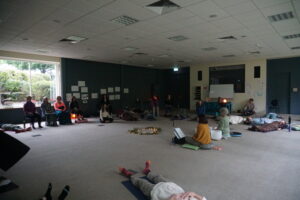
5. Facilitation support
Planning a meditation retreat can be a lot of work. Running a retreat on your own can also be a lot of work. Holding space through your teachings and managing the logics of the day may mean that you’re being pulled in many directions. You may like to consider if you’ll need facilitation support throughout the retreat. This could take the form of:
- Collaborating with another business or teacher so they can help share the workload and teachings
- Outsourcing components of the retreat by hiring additional teachers for specific components of the retreat (i.e. a Yoga Teacher or Sound Healer)
- Hiring a casual administrative assistant or event planner who can attend the retreat and oversee the logistics for you
The hiring of additional support may not be feasible for you just yet. (Remember to refer back to your retreat budget to see if this works!) If so, then planning is key. Clear and concise run sheets and pre-planning can help ease the load on the day. Anything you can in advance (such as organising handouts) will help.
Getting clear on the purpose of your retreat
If you’re ready to get started planning your retreat, you may like to explore the below prompts in your journal. See what ideas organically evolve for you. These may bring a sense of clarity and direction to support you before you begin:
- “The unique experience I would like to offer my clients is…..”
- “The techniques I love to teach the most are….”
- “Something unique I can bring to a retreat is….”
- “By offering a retreat to my clients, I would like to….”
- “The next best step I can take to start planning my retreat is….”
Happy planning!
As part of your training at ACMM you have the option to attend an in-person retreat !
At ACMM our Meditation Workshops and Classes elective supports you to bring your project to fruition through a structured program of questions and practical activities. You can access this elective as part of the Advanced Certificate and Diploma Training Options.
Find out if our courses are the right fit for you. Book a Zoom Discovery Call with us today!
Blog by ACMM Coach Sammy Wynn
